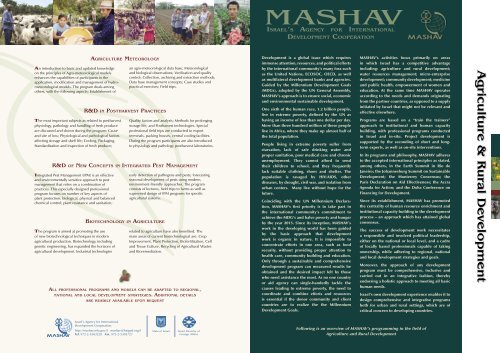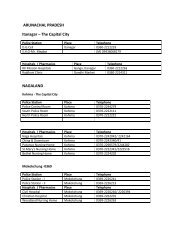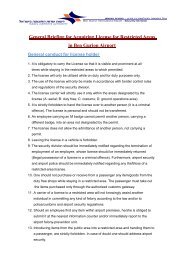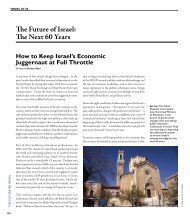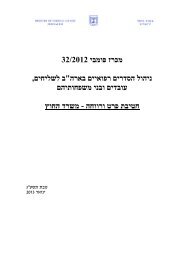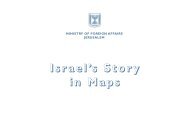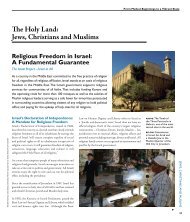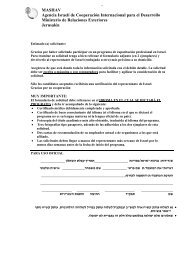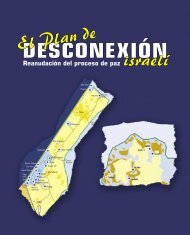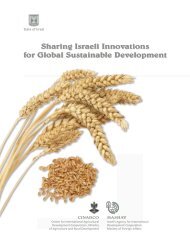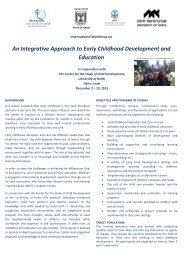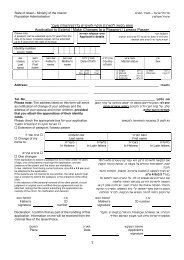MASHAV - Israel Ministry of Foreign Affairs
MASHAV - Israel Ministry of Foreign Affairs
MASHAV - Israel Ministry of Foreign Affairs
You also want an ePaper? Increase the reach of your titles
YUMPU automatically turns print PDFs into web optimized ePapers that Google loves.
<strong>MASHAV</strong><br />
ISRAEL’S AGENCY FOR INTERNATIONAL<br />
DEVELOPMENT COOPERATION<br />
An introduction to basic and updated knowledge<br />
on the principles <strong>of</strong> Agro-meteorological models<br />
enhances the capabilities <strong>of</strong> participants in the<br />
application, modification and management <strong>of</strong> hydrometeorological<br />
models. The program deals among<br />
others, with the following aspects: Establishment <strong>of</strong><br />
The most important subjects as related to postharvest<br />
physiology, pathology and handling <strong>of</strong> fresh produce<br />
are discussed and shown during the program: Cause<br />
and site <strong>of</strong> loss; Physiological and pathological factors<br />
affecting storage and shelf life; Cooling, Packaging,<br />
Standardization and inspection <strong>of</strong> fresh produce;<br />
AGRICULTURE METEOROLOGY<br />
R&D IN POSTHARVEST PRACTICES<br />
an agro-meteorological data base; Meteorological<br />
and biological observations; Verification and quality<br />
control; Collection, archiving and extraction methods;<br />
Data base management concepts; Case studies and<br />
practical exercises; Field trips.<br />
Quality factors and analysis; Methods for prolonging<br />
storage life; and Postharvest technologies. Special<br />
pr<strong>of</strong>essional field trips are conducted to export<br />
terminals, packing houses, central cooling facilities.<br />
During the program participants are also introduced<br />
to physiology and pathology postharvest laboratories.<br />
R&D OF NEW CONCEPTS IN INTEGRATED PEST MANAGEMENT<br />
Integrated Pest Management (IPM) is an effective<br />
and environmentally sensitive approach to pest<br />
management that relies on a combination <strong>of</strong><br />
practices. This especially designed pr<strong>of</strong>essional<br />
program focuses on number <strong>of</strong> key aspects <strong>of</strong><br />
plant protection: biological, physical and balanced<br />
chemical control; plant resistance and sanitation;<br />
The program is aimed at promoting the use<br />
<strong>of</strong> new biotechnological techniques in modern<br />
agricultural production. Biotechnology, including<br />
genetic engineering, has expanded the horizons <strong>of</strong><br />
agricultural development. Industrial technologies<br />
BIOTECHNOLOGY IN AGRICULTURE<br />
early detection <strong>of</strong> pathogens and pests; forecasting<br />
seasonal development <strong>of</strong> pests using modern,<br />
environment-friendly approaches. The program<br />
consists <strong>of</strong> lectures, field trips to farms as well as<br />
supervised design <strong>of</strong> IPM programs for specific<br />
agricultural systems.<br />
related to agriculture have also benefited. The<br />
main areas <strong>of</strong> current biotechnological are: Crop<br />
Improvement, Plant Protection, Bi<strong>of</strong>ertilization, Cell<br />
and Tissue Culture, Recycling <strong>of</strong> Agricultural Wastes<br />
and Bioremediation.<br />
ALL PROFESSIONAL PROGRAMS AND MODELS CAN BE ADAPTED TO REGIONAL,<br />
NATIONAL AND LOCAL DEVELOPMENT STRATEGIES. ADDITIONAL DETAILS<br />
ARE READILY AVAILABLE UPON REQUEST<br />
Development is a global issue which requires<br />
immense attention, resources, and political efforts<br />
by the international community’s many fora such<br />
as the United Nations, ECOSOC, OECD, as well<br />
as multilateral development banks and agencies.<br />
Guided by the Millennium Development Goals<br />
(MDGs), adopted by the UN General Assembly,<br />
<strong>MASHAV</strong>’s approach is to ensure social, economic<br />
and environmental sustainable development.<br />
One sixth <strong>of</strong> the human race, 1.2 billion people,<br />
live in extreme poverty, defined by the UN as<br />
having an income <strong>of</strong> less than one dollar per day.<br />
More than three hundred million <strong>of</strong> these people<br />
live in Africa, where they make up almost half <strong>of</strong><br />
the total population.<br />
People living in extreme poverty suffer from<br />
starvation, lack <strong>of</strong> safe drinking water and<br />
proper sanitation, poor medical care and chronic<br />
unemployment. They cannot afford to send<br />
their children to school, and they frequently<br />
lack suitable clothing, shoes and shelter. The<br />
population is ravaged by HIV/AIDS, other<br />
diseases, by drought, civil war, and isolation from<br />
urban centers. Many live without hope for the<br />
future.<br />
Coinciding with the UN Millennium Declaration,<br />
<strong>MASHAV</strong>’s first priority is to take part in<br />
the international community’s commitment to<br />
achieve the MDG’s and halve poverty and hunger<br />
by the year 2015. Since its inception, <strong>MASHAV</strong>’s<br />
work in the developing world has been guided<br />
by the basic approach that development<br />
work is organic in nature. It is impossible to<br />
concentrate efforts in one area, such as food<br />
security, without providing proper attention to<br />
health care, community building and education.<br />
Only through a sustainable and comprehensive<br />
development program can measured results be<br />
obtained and the desired impact felt by those<br />
who need assistance the most. As no one country<br />
or aid agency can single-handedly tackle the<br />
causes leading to extreme poverty, the need to<br />
coordinate and combine efforts and resources<br />
is essential if the donor community and client<br />
countries are to realize the the Millennium<br />
Development Goals.<br />
<strong>MASHAV</strong>’s activities focus primarily on areas<br />
in which <strong>Israel</strong> has a competitive advantage<br />
including: agriculture and rural development;<br />
water resources management; micro-enterprise<br />
development; community development; medicine<br />
and public health, empowerment <strong>of</strong> women and<br />
education. At the same time <strong>MASHAV</strong> operates<br />
according to the needs and demands originating<br />
from the partner countries, as opposed to a supply<br />
initiated by <strong>Israel</strong> that might not be relevant and<br />
effective elsewhere.<br />
Programs are based on a “train the trainers”<br />
approach to institutional and human capacity<br />
building, with pr<strong>of</strong>essional programs conducted<br />
in <strong>Israel</strong> and in-situ. Project development is<br />
supported by the seconding <strong>of</strong> short and longterm<br />
experts, as well as on-site interventions.<br />
In its programs and philosophy, <strong>MASHAV</strong> adheres<br />
to the accepted international principles as stated,<br />
among others, in the Earth Summit in Rio de<br />
Janeiro; the Johannesburg Summit on Sustainable<br />
Development; the Monterrey Consensus; the<br />
Paris Declaration on Aid Effectiveness; the Accra<br />
Agenda for Action; and the Doha Conference on<br />
Financing for Development.<br />
Since its establishment, <strong>MASHAV</strong> has promoted<br />
the centrality <strong>of</strong> human resource enrichment and<br />
institutional capacity building in the development<br />
process – an approach which has attained global<br />
consensus.<br />
The success <strong>of</strong> development work necessitates<br />
a responsible and involved political leadership,<br />
either on the national or local level, and a cadre<br />
<strong>of</strong> locally based pr<strong>of</strong>essionals capable <strong>of</strong> taking<br />
ownership, while adhering to regional, national<br />
and local development strategies and goals.<br />
Moreover, the approach <strong>of</strong> any development<br />
program must be comprehensive, inclusive and<br />
carried out in an integrative fashion, thereby<br />
endorsing a holistic approach to meeting all basic<br />
human needs.<br />
<strong>Israel</strong>’s own development experience enables it to<br />
design comprehensive and integrative programs<br />
both for urban and rural settings, which are <strong>of</strong><br />
critical concern to developing countries.<br />
Agriculture & Rural Development<br />
<strong>Israel</strong>’s Agency for International<br />
Development Cooperation<br />
http://mashav.mfa.gov.il mashav@haigud.org.il<br />
Tel. 972-2-5303220 Fax. 972-2-5303727<br />
State <strong>of</strong> <strong>Israel</strong><br />
<strong>Israel</strong> <strong>Ministry</strong> <strong>of</strong><br />
<strong>Foreign</strong> <strong>Affairs</strong><br />
Following is an overview <strong>of</strong> <strong>MASHAV</strong>’s programming in the field <strong>of</strong><br />
Agriculture and Rural Development
<strong>MASHAV</strong>’s agricultural programming deals with the introduction<br />
<strong>of</strong> modern technologies and agro-technical methods designed to increase the levels,<br />
sustainability and quality <strong>of</strong> agricultural production to ensure food security. It also<br />
concentrates on introducing effective support systems to enhance the economic viability<br />
<strong>of</strong> agriculture in areas such as marketing, storage and transport, the supply <strong>of</strong> agricultural<br />
inputs, granting <strong>of</strong> credit and finance to the agricultural sector and upgrading the work <strong>of</strong><br />
extension services.<br />
THE FOLLOWING ARE BRIEF DESCRIPTIONS OF SOME OF<br />
<strong>MASHAV</strong>’S PROFESSIONAL PROGRAMS IN THE FIELD:<br />
There is no other way to attain basic food security and sustainability other than promoting<br />
and engaging countries in the enhancement <strong>of</strong> their primary sector – agriculture – in basic<br />
food crop production, food storage and post harvest care.<br />
There is no shortcut to food security. <strong>MASHAV</strong>’s approach to agricultural development is<br />
based on harnessing science, technology and extension. Applied research, the introduction<br />
<strong>of</strong> innovative technologies and the promotion <strong>of</strong> agricultural crop intensification and<br />
diversification are key elements in attaining food security.<br />
The challenge is to adapt many <strong>of</strong> the known improvements in the use <strong>of</strong> agricultural<br />
practices and technologies such as fertilizer application, crop production, and protection<br />
methods, and make them more accessible and adjustable to the circumstances and the<br />
needs <strong>of</strong> the small-holder farmer in the rural areas.<br />
According to the UN, desertification is the degradation<br />
<strong>of</strong> land in arid, semi-arid, and dry sub-humid areas. It is<br />
caused primarily by human activities and climatic variations.<br />
Desertification does not refer to the expansion <strong>of</strong> existing<br />
deserts. It occurs because dryland ecosystems, which cover<br />
over one third <strong>of</strong> the world’s land area, are extremely<br />
vulnerable to over-exploitation and inappropriate land<br />
use. Poverty, political instability, deforestation, overgrazing,<br />
and bad irrigation practices can all undermine the land’s<br />
fertility. Over 250 million people are directly affected by<br />
desertification. In addition, some one thousand million<br />
people in over one hundred countries are at risk. These<br />
people are amongst the world’s poorest, most marginalized,<br />
and politically disenfranchised.<br />
Degraded drylands need not be irrevocably lost.<br />
Desertification can be halted, dryland productivity can be<br />
increased, and these lands can be nurtured to sustain growing<br />
populations while retaining their delicate ecosystems. Hope<br />
The issue <strong>of</strong> water is connected to many challenges facing<br />
us today, such as growing global water scarcity, polluted water<br />
reservoirs, environmental hazards, food security, sanitation<br />
desalination technologies and water management. These<br />
global concerns are <strong>of</strong> high priority on the social, economic,<br />
environmental and political agendas <strong>of</strong> the international<br />
community.<br />
<strong>MASHAV</strong>’s approach combines the transfer <strong>of</strong> technology,<br />
research and development, and hands-on experience with<br />
hi-tech technologies originating from leading <strong>Israel</strong>i experts<br />
and institutions – ranging from the public/government<br />
sectors to the corporate community, as well as to academia.<br />
To improve the services needed to provide access, safety,<br />
and security in countries facing serious water challenges,<br />
COMBATING DESERTIFICATION<br />
WORLD WATER ISSUES<br />
lies with countries sharing their experiences and applying<br />
practical, scientifically-supported solutions to ensure that<br />
we learn how to live in and with the desert. Economic<br />
development is balanced against conservation <strong>of</strong> the unique<br />
and fragile desert ecosystems.<br />
Technological innovations will increasingly be called upon<br />
to address the growing challenges associated with adapting<br />
to the threat <strong>of</strong> global warming and the anticipated impacts<br />
<strong>of</strong> climate change. Most <strong>of</strong> <strong>Israel</strong> is dryland and 60% <strong>of</strong> it is<br />
the Negev Desert. <strong>MASHAV</strong> places special emphasis on the<br />
critical issues <strong>of</strong> desertification and developing the desert by<br />
introducing international cooperative programs <strong>of</strong> training,<br />
project development and research; these relate to land<br />
and water limitations (e.g. desert agriculture, aquaculture,<br />
afforestation, management <strong>of</strong> water resources) yet always aim<br />
at identifying comparative advantages that may be inherent in<br />
specific dryland locations.<br />
<strong>MASHAV</strong> is poised to share the knowledge and modern<br />
technologies gained during <strong>Israel</strong>’s own development<br />
process on subjects including water management, irrigation<br />
techniques, desalination, urban water loss, and sewage and<br />
brackish water treatment.<br />
<strong>MASHAV</strong>’s main areas <strong>of</strong> expertise in agriculture include the<br />
following subjects: Combating Desertification; Water Issues;<br />
Crop Diversification and Intensification; Livestock and Dairy<br />
Milk Development; Land Conservation and Efficient Use <strong>of</strong><br />
Natural Resources; Greenhouse and Protected Agricultural<br />
Technologies and Practices; Environmentally Friendly and<br />
Sustainable Farming Systems; Marketing <strong>of</strong> Agricultural<br />
Production; Integrated Pest Management.<br />
COMBATING DROUGHT AND DESERTIFICATION AND PROMOTING<br />
SUSTAINABLE DEVELOPMENT IN DRYLAND AREAS<br />
Following the growing global awareness<br />
<strong>of</strong> drought and desertification, the United<br />
Nations Division for Sustainable Development,<br />
Department <strong>of</strong> Economic and Social <strong>Affairs</strong><br />
(UN-DESA), in collaboration with <strong>MASHAV</strong>,<br />
organized this international capacity building<br />
workshop based on <strong>MASHAV</strong>’s expertise<br />
in “training the trainers” in science-based<br />
decision making tools and processes in<br />
combating drought and desertification.<br />
The workshop is structured around the<br />
following main themes: Benchmarks and<br />
Indicators <strong>of</strong> Desertification; Assessment Tools;<br />
Overgrazing and Carrying Capacity; Drought<br />
and Early Warming Systems; Sustainable<br />
Water Management and Water Harvesting;<br />
Desert Agriculture; Irrigation Techniques and<br />
Best Practices in Arid and Semi-Arid Areas;<br />
Sustainable Management <strong>of</strong> Forests<br />
in Drylands.<br />
Objectives: Our program aims to share with<br />
participants an enhanced understanding <strong>of</strong> the<br />
sciences relating to the incidence <strong>of</strong> drought<br />
and desertification and to develop better<br />
capabilities for addressing the economic,<br />
social, and environmental challenges <strong>of</strong><br />
drought and desertification. Participants<br />
will learn to employ science-based decision<br />
making tools and processes in agriculture,<br />
forestry, and water resource management,<br />
and to identify and share best practices in<br />
combating desertification.<br />
TIPA: LOW PRESSURE IRRIGATION SYSTEM FOR SMALLHOLDERS<br />
TIPA is a small-scale horticultural production<br />
package based on low-pressure drip-irrigation,<br />
a mix <strong>of</strong> annual and tree crops, and an<br />
“operating system” which allows the farmer to<br />
irrigate according to scientific principles.<br />
The benefits <strong>of</strong> using the TIPA system include<br />
higher yields <strong>of</strong> improved quality vegetables<br />
and fruits, the ability to produce crops yearround,<br />
a most efficient utilization <strong>of</strong> water<br />
resources, decreased labor requirements for<br />
irrigation and weeding, and greater likelihood<br />
<strong>of</strong> maintaining the productive capacity <strong>of</strong><br />
the soil. The hardware components <strong>of</strong> the<br />
system are a concrete reservoir, a plastic drip<br />
irrigation kit (a basic unit covers an area <strong>of</strong><br />
500 m2), and a water pump.<br />
In the majority <strong>of</strong> semi-arid regions, gardens<br />
for the production <strong>of</strong> vegetables, tubers, and<br />
fruit for the family and for markets are usually<br />
the only form <strong>of</strong> irrigated agriculture.<br />
The mix <strong>of</strong> crops allows households to meet<br />
their own needs and sell excess in local<br />
markets. The size <strong>of</strong> market gardens ranges<br />
from tens <strong>of</strong> square meters to a few thousand<br />
square meters.<br />
Constraints <strong>of</strong> the present systems in<br />
developing nations are that:<br />
Irrigation is labor intensive;<br />
Poor water and nutrient management result<br />
in low and inferior quality yields;<br />
There is a limited production period due<br />
to unfavorable climatic conditions and<br />
unavailability <strong>of</strong> labor during the rainy<br />
season;<br />
Soil salinity and groundwater in surface<br />
irrigated systems negatively impact the<br />
environment.<br />
The TIPA system overcomes all <strong>of</strong> these<br />
constraints. It results in considerable labor<br />
conservation, marked increases in yields, and<br />
real improvements in quality. TIPA optimizes<br />
the use <strong>of</strong> problematic soils, minimizes soil<br />
and ground water contamination and, in semiarid<br />
Africa, it facilitates the extension <strong>of</strong> the<br />
production season from the present 5 months<br />
<strong>of</strong> the year to 12 months, or year-round. The<br />
TIPA system is being successfully implemented<br />
in South Africa and Senegal.<br />
Agriculture & Rural Development


